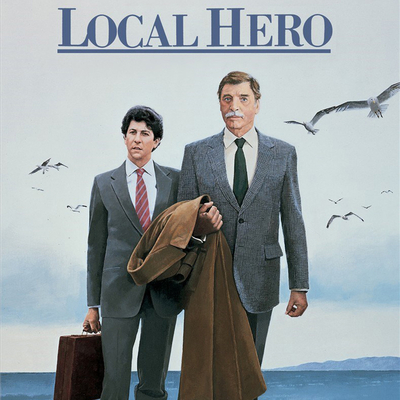The word "charming" is used more than any other to describe Scottish director Bill Forsyth's comedies. It's both a blessing and a curse; by the age of forty we learn not to trust charming people (charm is the polished walnut veneer that disguises a sociopath) and charm in art is more often than not the extra spoonful of sugar that turns compelling into cloying. Forsyth walks a very fine line with Local Hero, the 1983 film that might be his masterpiece, and if you're a fan who already knows how the film ends, the way he negotiates that tightrope is a huge part of the drama.
The film was Forsyth's entry into the big leagues, with American actors and a big Hollywood star. You'd never have imagined he'd pull this off just four years earlier if you'd been in the small but enthusiastic audience for That Sinking Feeling, his ultra-low budget debut feature (made for a reported $10,000; literally a kitchen sink film) about a group of no-hope unemployed Glasgow teenagers with a dopey plan to steal a bunch of stainless steel sinks.
You would have known that Forsyth had real talent if you'd seen his next picture, Gregory's Girl (1980), another small film that became a hit on the festival, indie and repertory cinema circuits despite the thick Glaswegian accents that required re-dubbing for American audiences. Forsyth might have been sent south to make another comedy with British actors instead of Scottish teenagers to test his mettle, but the early '80s were a boom time for cinema, especially in the UK, and Forsyth got his big break while Duran Duran were still making hit singles.
The film begins on a freeway snaking through Houston, Texas, and "Mac" MacIntyre (Peter Riegert) in his Porsche 903 on the way to work at Knox Oil. He's a corporate acquisitions hotshot who's been given the task of acquiring a whole village on the Scottish coast to demolish for a massive refinery for their offshore drilling operations. It's a big deal, and one in which the company CEO Felix Happer (Burt Lancaster) has taken a personal interest.
Mac is initially unwilling; he's used to closing these sorts of deals long distance ("I'm more of a telex man" he keeps insisting) but the company wants him to negotiate in person, assuming his Scottish background will give him an edge. What he's unwilling to admit is that the name was chosen by his grandfather while emigrating from Hungary, assuming that it sounded American. It's just the first of the many absurdities and misunderstandings that comprise the Forsyth touch in a comedy.
Most American films like to portray titans of industry as human monoliths in thrall to the pursuit of profit and growth. Burt Lancaster was certainly capable of this, but Forsyth makes him an eccentric, as obsessed with astronomy as the petroleum industry. When Mac is called to his office for an audience, we show him ascending a precarious mirrored staircase without handrails; Happer's office is a luxury eyrie, its sliding doors and windows controlled by push buttons, with an observatory and a planetarium built into the CEO's office ceiling.
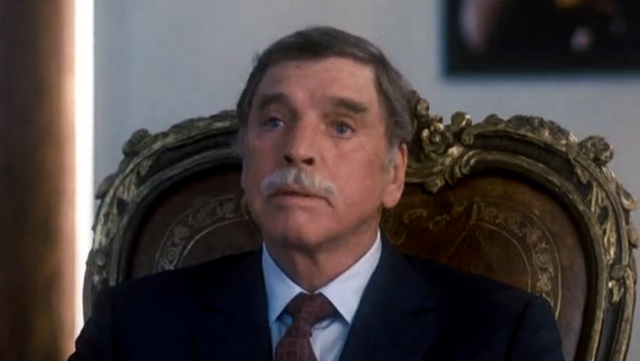
He lives alone there, never having married, and we meet him during a session with Moritz (Norman Chancer), his therapist, who's committed to his own brand of aversion therapy, which involves insulting his client to break down his ego. Even when Happer tries to fire him after he suggests escalating his treatment to physical abuse, Moritz is committed to making a breakthrough, and begins phoning Happer at night to spew obscenities at him. When we last see the shrink, he's rappelled down the side of the Knox Oil skyscraper to paste letters reading "HAPPER IS A MOTHERFU" on his office windows, which prompts the CEO to call in police sharpshooters.
It's a very Scottish kind of gag, as this is what American psychotherapy (and American wealth) looks like to a Scotsman who knows that, if you want this sort of hostility in your life, you can get it for free from your friends and family.
Less funny is Mac's sad sack emotional life. He gets turned down by a co-worker he asks out for a celebratory drink before heading to Scotland, and back in his apartment we listen to him on the phone with his ex, a conversation that goes from conciliatory to hostile in less than a minute. He's a lonely man looking for solace in work and luxury possessions and the art of the deal, and waiting for him on the other side of the Atlantic is Oldsen (Peter Capaldi), Knox Oil's point man in Scotland and Mac's emotional foil.
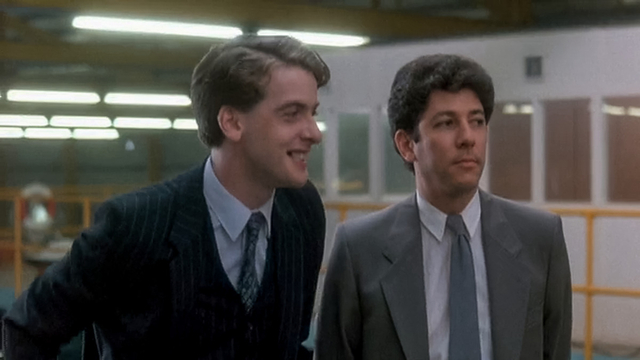
Mac represents everything Oldsen admires, starting with his status at Knox Oil. But where Mac's whole context is America ("I'm more of a telex man.") Oldsen is effortlessly fluent in several languages, though this matters little as he's stuck at a branch office of the company, tasked with being Mac's driver and errand boy.
And where Mac has developed a cool façade to bring to negotiations, Oldsen is awkward and socially inept – really just a slightly grown-up version of the teenagers in That Sinking Feeling and especially Gregory's Girl. At the Knox Oil research facility where boffins have put together a scale model of Ferness, the town Mac's tasked with buying along with its adjacent coastline, the two men meet Marina (Jenny Seagrove), a research scientist who does the classic pretty girl reveal – removing her big glasses and letting down her hair before going one step further, doffing her lab coat to reveal a swimsuit before she plunges into the tank to fix a faulty sensor. This makes Mac drop his businesslike mask, but it reduces Oldsen to bug eyes and a bobbing Adam's apple.
The scene is Mac's first encounter with the Scots, in the person of the engineers who acquaint him with Knox's big plans for Ferness: bulldozing the town off the map and burying an adjacent beach under the rubble to create the docks, pipelines, storage tanks, refinery and adjacent buildings. The two men marvel at what the transformation their plans will make of the fishing village and its surroundings, congratulating themselves on a facility that they claim will last thousands of years – longer if one of them could implement his plan to reverse the gulfstream and postpone any future ice age.
"Dream large!" he exhorts Mac and Oldsen as they leave for Ferness.
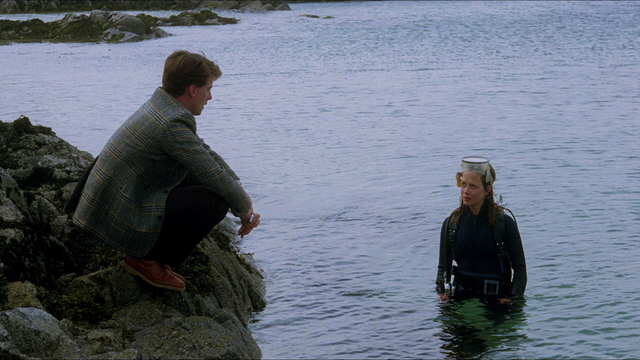
North Sea Oil was a very big deal when Local Hero was made. Drilling had been going on in the ocean for a century but the '70s oil crisis made extraction cost effective, and the potential resources were one of the few rays of hope for Britain during the endless economic crisis that brought Margaret Thatcher to power. (Happer's influence is hinted at when his receptionist has a friendly chat with the prime minister before putting her call through to her boss, while Mac cools his heels in the waiting room.)
It became a major plank of the Scottish National Party in the '70s, when the party tried to build a case for independence with the slogan "It's Scotland's Oil", despite lacking the sovereignty to claim any influence or profits from the industry outside of very particular interpretations of the 1964 Continental Shelf Act. But dreaming large had always been the marching order of the SNP, and it motivated them to gain the power to extend jurisdiction over offshore oil with the 1998 Scotland Act and the Scottish Adjacent Waters Boundary Order of 1999.
Ironically, the leftward drift the SNP had on Scottish politics led to greens in the Radical Independence Campaign repurposing the SNP's old slogan to insist that Scotland's oil should stay in the ground. One wonders how the RIC intends to finance the Scottish republic should they come to form its government; perhaps they'll nationalize the sales of square feet of Scottish wilderness to create mail order lairds.
On the drive to Ferness in Olden's Ford Cortina the fog rolls in and they hit a rabbit. Oldsen wants to put it out of its misery but Mac is appalled, and the bunny ends up recuperating in the back seat while the two men wait out the fog by sleeping in the car overnight. To me, at least, it's a reference – perhaps satiric – to the village in Brigadoon, as by the time they arrive at Ferness the film shifts its tone dramatically.
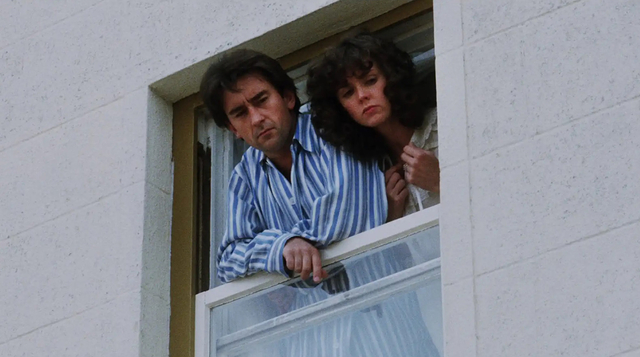
There's only one hotel in town, run by Gordon (Denis Lawson, famous as Wedge Antilles in the Star Wars films) and his wife Stella (Jennifer Black). After asking where they can find Urquhart, the local accountant, Mac and Oldsen walk into his office next door to discover that Gordon is Urquhart, and that everybody in Ferness has more than one job to make a living.
Urquhart (it takes a while for Mac to learn to pronounce his name properly) agrees to be their middleman in negotiations with the townspeople. When the oilmen are out of sight, it's clear that, far from being unwilling to leave their homes, their land and their way of life, the citizens of Ferness can't wait to sell up, but Urquhart advises them to be coy to help drive up the price.
Back at the office in Houston, his superiors had told him that this wouldn't be a walkover like his recent deals in places like Mexico. "We are not in a third world situation."
"You won't be dealing with a bunch of Indians."
Mac and Oldsen are obliged to stick around, and they try to keep up a businesslike demeanor, taking walks on the beach in suits and carrying briefcases. There's only one way to contact the outside world via the public phone box on the pier across from the pub, and making a call involves hands full of change pumped into the coin slot every few seconds. Mac's only other lifeline to Houston and the company is his high-tech watch, programmed to beep whenever meetings start at the office. For anyone too young to remember, it's a snapshot of the world before cheap long-distance rates, competing carriers, wifi everywhere, satellite networks and, of course, cell phones. Mac the telex man has been banished to a world barely out of the telegraph age.
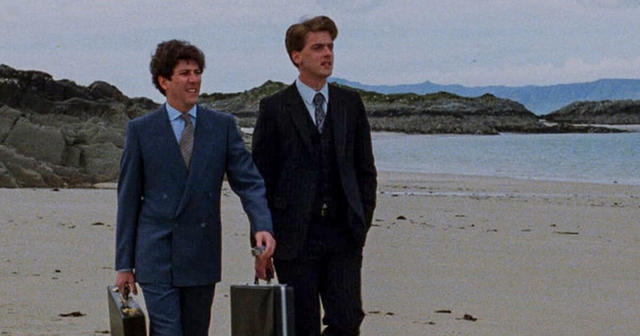
The locals, on the other hand, are looking forward to leaving all this behind, debating the utility of a Rolls Royce over a Maserati when Mac isn't around. A town meeting at the church to strategize a bigger buyout is almost discovered by Mac and Oldsen, but Urquhart sends the minister, Reverend Macpherson (Christopher Asante) out to distract them.
While Mac opens a negotiation for the church property with the Reverend, fighter jets make their daily training runs over the town.
"As long as they're bombing the beach they can't be bombing anywhere else," muses the Reverend. "It's kind of comforting."
Perhaps, says Mac, but the jets and their roar "spoil a very nice area."
Like Mac, the Reverend – despite his name – isn't Scottish, but an African who arrived in Ferness as a student and never left. It's actually a very Scottish situation; unlike the Irish who hoard the authority to decide who's really Irish (withholding it from descendants of Famine migrants and Bostonians who stuff the tip jars in pubs with money for the IRA), the Scots are remarkably liberal about Scottishness. It's why Glasgow is full of Scots with Italian names (like Peter Capaldi) whose families came to sell ice cream, or Sikhs in Edinburgh with thick brogues, kirpans, turbans and kilts, all of them proudly and undeniably Scottish.
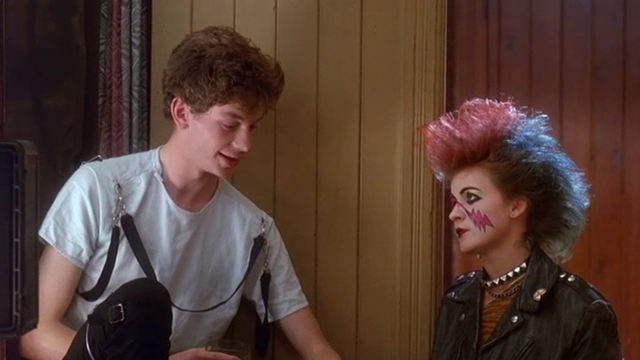
Forsyth confounds our preconceptions about the insularity of remote communities by including a pair of punks in Ferness. Ricky (John Gordon Sinclair, the star of Gregory's Girl) spends much of the film tearing through the town on his scooter. His extravagantly spike-haired girlfriend Pauline (Caroline Guthrie) takes a shine to Oldsen at the town ceilidh, and Ricky asks her what she sees in him.
"He's different," she says.
Gradually, Mac and Oldsen are seduced by the town, leaving their ties and briefcases in their room as they stroll the beach, where Mac leaves his watch in a tidal pool while collecting shells. Oldsen begins haunting the cove where Marina emerges regularly from the water, infatuated with the pretty marine biologist who, he discovers, has webbed toes. Mac, on the other hand, starts falling for Urquhart's wife Stella, despite (or perhaps because of) the very vigorous and audible sex life the couple enjoy.
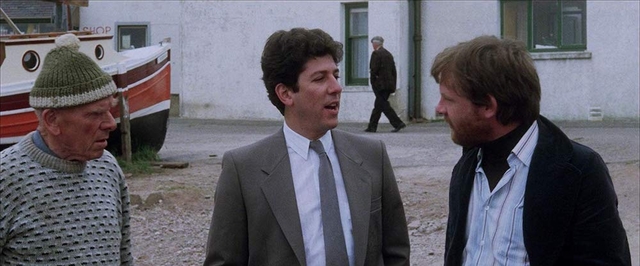
Mac takes to spending time with the locals mending lobster traps by the pier, who are amazed that he only does one job for a living. He feels humbled by the cooperation and community of the town, and notices the toddler in the stroller that's always parked next to them on the shingle.
"Whose baby?" he asks. The looks exchanged between the men, as if no one has ever asked the question before, before realizing they don't have an answer, is one of Forsyth's best gags in the film.
Even more than Brigadoon, Local Hero reminds me of the best Ealing comedies, and especially Alexander Mackendrick's Whiskey Galore! (1949), about a remote Scottish town that loots a shipwrecked freighter carrying 50,000 cases of scarce, wartime-rationed whiskey. There are so many similarities – the isolation of the town, the slyness of the locals, their contest with "foreign" authority and a celebration: a rèiteach in Mackendrick's film, a ceilidh in Forsyth's.
The ceilidh draws in another visitor – Victor (Christopher Rozycki), the Russian captain of a fishing boat having a long distance affair with the woman who runs the village tuck shop (despite his very angry wife), and an enthusiastic capitalist who has Urquhart run an investment portfolio for him. It seems that in 1983, when nobody with credentials was predicting the end of the Soviet Union, Forsyth knew something they didn't.
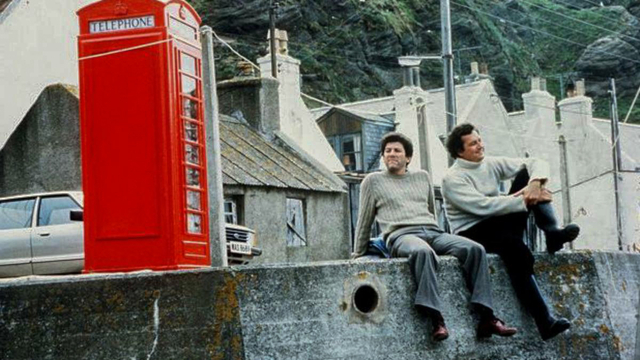
The deal that will kill Ferness looks done until Urquhart realizes that Ben (Fulton Mackay), the beachcomber living in a shack by the water, isn't a squatter but the actual owner of a serious tract of beachside property. His ancestor was gifted the land for killing the inconvenient brother of some Scottish king before the English conquest, the deed a historic document in a museum in Edinburgh, and no matter how much money Mac offers, Ben won't sell.
For a moment, the film looks like it's going to turn ugly as the townspeople descend en masse on Ben's beach to deal out some serious physical persuasion, but the confrontation is interrupted by an actual deus ex machina, as Happer descends from the twilight sky in a Knox Oil helicopter, drawn by Mac's telephone reports of meteor showers and a nearly weekly aurora borealis.
The angry mob is jarring when it appears; up till that point Local Hero had been about as gentle as Scottish comedy could get. More than any ethnic identity, Scottishness is about a shared worldview, beginning with a general pride in being the kinds of wild barbarians who could scare the Roman empire into putting up a wall to keep them at bay, and then turning on a dime after the humiliation of English annexation to become the engineering powerhouse behind the industrial revolution. Romantic notions about the past are always trumped by pragmatism.
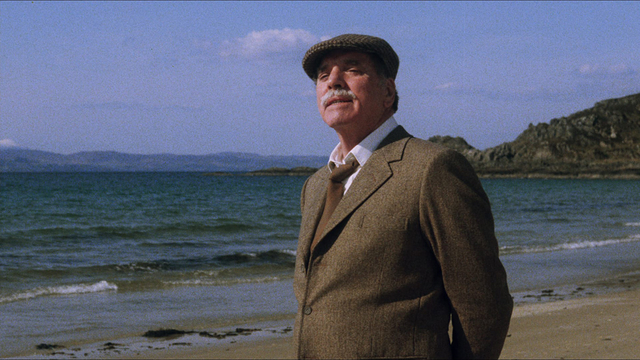
Scottish comedy can be rather fierce, and thanks to it Scots have a reputation for brutal candour – embodied in Peter Capaldi's obscene and unrelenting political spin doctor Malcolm Tucker in the BBC series The Thick of It. Then there's Trainspotting (1996), a comedy about hopeless junkies in the orbit of a psychopath (Robert Carlyle's indelible Begbie) and series like Chewin' the Fat, Rab C. Nesbitt, Still Game, Burnistoun and Limmy's Show, most of which require subtitles for audiences outside Scotland.
Forsyth did a lot to make Local Hero palatable to moviegoers outside Scotland, starting by taking his setting out of Glasgow and into the Highlands, where the accent might be more amenable to foreign ears. Still, the appearance of a lynch mob would be jarring if the sharp edges of Scottish comedy were unknown to you. Oh, and I didn't tell you what happens to the rabbit.
Even stranger from a distance is the film's ambivalence about the eagerness of the townspeople to sell up and leave Ferness to Knox Oil's bulldozers. An essay about Local Hero on the Criterion Collection website states that "our stubborn reluctance to accept either the reality of environmental crisis or our responsibility for bringing it about in the first place" is the "thematic beating heart" of the movie. This sounds like retconning to me.
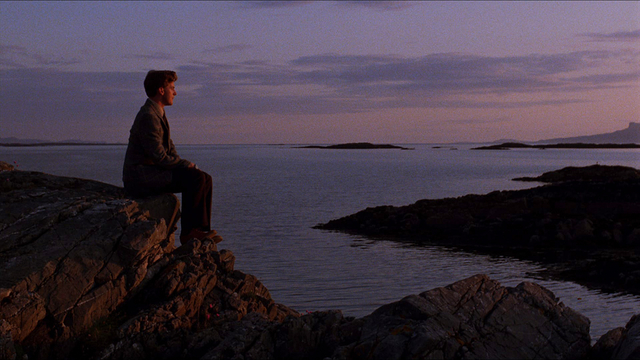
There is, to be sure, real natural beauty showcased in cinematographer Chris Menges' portrait of Ferness, from the misty hills to the coves ringed with rocks to the night sky, ablaze with light, that pushes Mac to an epiphany. But it's also hard to fault its citizens for wanting the easier, more convenient life that seems to be on offer anywhere less picturesque.
After all, as Victor tells Mac, "you can't eat scenery."
You can, however, travel thousands of miles to enjoy it, and Pennan – the tiny village on the Aberdeenshire coast that provided the exteriors for Forsyth's film – is still a pilgrimage site that keeps the local hotel open despite just a handful of year-round residents. You can make a phone call from the public phone box, and even though the one in the film was a prop, built to be located on a more scenic spot, the town's actual red phone box was heritage listed in 1989.
Local Hero is ultimately a fantasy about finding a home, made for people who, like Riegert's Mac, feel overwhelmed and underserved by their lives. Drunk at the ceilidh, he offers Urquhart a swap – he can have his job and $80,000 a year, his Porsche, his apartment and his portfolio of securities in exchange for the hotel, the pub, his tiny accountant's office – and Stella.
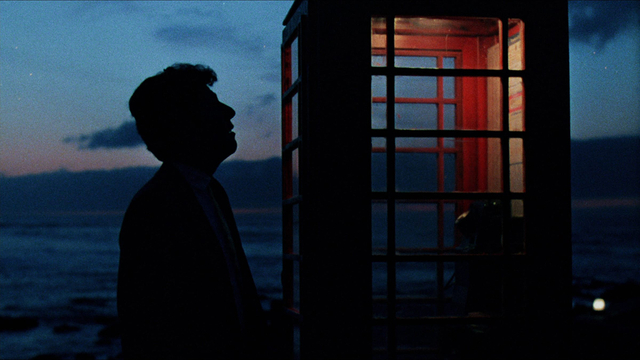
It's not like the film doesn't get a happy ending; Oldsen and Marina get theirs and Happer, the rich man, certainly gets his. The citizens of Ferness certainly don't – or at least not the one they had hoped for. (It's not hard to imagine that Victor will get his, and sooner than he thinks.) Urquhart might finally realize that he already has his. Or maybe he won't; some people are never happy. Local Hero probably doesn't have a villain, but if it does, Urquhart might be it.
Which leaves Mac, snatching victory from the jaws of defeat despite himself, back in Houston, emptying the shells and rocks from his pockets. Writing about the movie in the Guardian, Bill Mann talks about having a "lump in his throat" watching Riegert's Mac try to make sense of what happened to him in Scotland.
"He stands at his kitchen counter wondering what to do next, the hushed march of oil capitalism buzzing gently outside," Mann writes, about a comedy that ends on a profoundly melancholic note, its protagonist nowhere near where he wishes he were, and no idea how to get there. Denying you that last laugh might not be anyone's idea of great comedy, but it makes Forsyth's film a masterpiece.
Mark Steyn Club members can let Rick know what they think by logging in and sharing in the comments below, as access to the comments section is one of many benefits that comes along with membership in the Mark Steyn Club.


